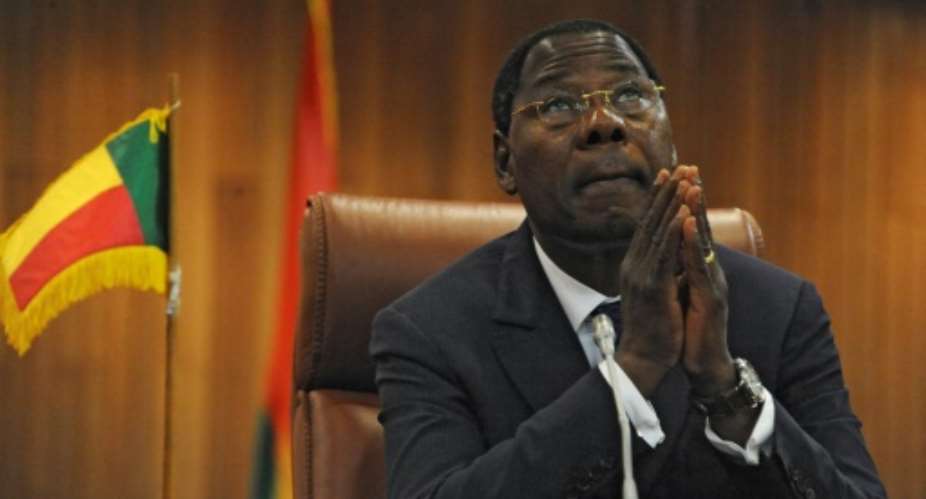Cotonou (AFP) - Benin is gearing up early for elections to replace President Thomas Boni Yayi, with top businessmen being seen for the first time as viable candidates rather than just political bankrollers.
Candidates have until January 12 next year to declare, while the campaign proper doesn't start in earnest in the tiny West African nation until February 11.
But already several big names are being mentioned, prompting predictions of a keenly fought, wide-open contest when first-round voting gets under way on February 28.
Chief among them are Sebastien Ajavon, who heads Benin's business leaders organisation, and Patrice Talon, now pardoned after accusations of involvement in an alleged plot to poison Boni Yayi.
Talon, 57, returned to Benin on Thursday after more than two years in exile.
Ajavon's supporters have already been out in force canvassing the electorate while "cotton king" Talon's name has been increasingly mentioned, even if he has yet to officially confirm his candidacy.
Add to that the presence of Prime Minister Lionel Zinsou, 50, a French-born former financier whose appointment earlier this year sparked rumours he was the president's anointed successor.
Zinsou has denied he has ambitions for the country's top job but some observers have likened his visits around the country to a pre-election campaign.
- Financial clout -
For political analyst Beo Cephise Aguiar, that captains of industry are being seriously considered is significant, as they had previously remained in the shadows.
Talon, for example, funded former banker Boni Yayi's successful campaigns in 2006 and 2011.
"Everything's changing now because the financial status of these candidates has made them be taken seriously," he told AFP.
"They're coming to shake up traditional politicians on their own turf."
In Godomey, just outside Benin's commercial capital and seat of government, Cotonou, supporters of 50-year-old Ajavon exchange views with the public.
"You all know what we've had to put up with from the Yayi regime," said one young man, Assifou.
"This time we have to change things and choose Ajavon, a businessman who's proved his worth."
"It's not the election campaign yet but we've got a battle plan to gradually send out our candidate's supporters," added Victorin Atolou, from Ajavon's campaign team.
"Our mission is to announce everywhere in Benin... the candidacy of Mr Ajavon for the 2016 presidential elections."
- Political failure -
Benin, a former French colony with 10.6 million people, is classed as a low-income country by the World Bank, with poor social and economic indicators in areas such as health and education.
Boni Yayi, in power since 2006, has sought to stamp out corruption and boost growth, particularly from foreign investment, to transform Benin's largely agricultural economy.
But his supposed personal ambitions have dominated recent political debate, after months of intrigue surrounding Talon and the alleged poisoning plot.
He has repeatedly denied wanting to stay on beyond the statutory two-term limit, despite opposition claims that was his real motive in a recent attempt to change the constitution.
In May this year, his Emerging Benin coalition (FBCE) won parliamentary elections but failed to secure an absolute majority in a vote seen as a test of his popularity.
The FBCE has not yet chosen its candidate, while the biggest opposition group, the Union Makes the Nation, had said it was going to declare a runner at the end of September.
"Negotiations are ongoing. We want to avoid disputes. That's why we're being cautious," said Jude Lodjou, the group's general coordinator, promising an announcement "in the next 10 to 15 days".
For now it is the businessmen who are attracting attention, with many seeing the fact they are being considered as an indictment on how Benin has been run -- and how it might change in the future.
"The presence of businessmen in politics is a sign of the failure of the political class which has to face the consequences," said newspaper columnist Adrien Amoussou.





 Akufo-Addo commissions Phase II of Kaleo solar power plant
Akufo-Addo commissions Phase II of Kaleo solar power plant
 NDC panics over Bawumia’s visit to Pope Francis
NDC panics over Bawumia’s visit to Pope Francis
 EC blasts Mahama over “false” claims on recruitment of Returning Officers
EC blasts Mahama over “false” claims on recruitment of Returning Officers
 Lands Minister gives ultimatum to Future Global Resources to revamp Prestea/Bogo...
Lands Minister gives ultimatum to Future Global Resources to revamp Prestea/Bogo...
 Wa Naa appeals to Akufo-Addo to audit state lands in Wa
Wa Naa appeals to Akufo-Addo to audit state lands in Wa
 Prof Opoku-Agyemang misunderstood Bawumia’s ‘driver mate’ analogy – Miracles Abo...
Prof Opoku-Agyemang misunderstood Bawumia’s ‘driver mate’ analogy – Miracles Abo...
 EU confident Ghana will not sign Anti-LGBTQI Bill
EU confident Ghana will not sign Anti-LGBTQI Bill
 Suspend implementation of Planting for Food and Jobs for 2024 - Stakeholders
Suspend implementation of Planting for Food and Jobs for 2024 - Stakeholders
 Tema West Municipal Assembly gets Ghana's First Female Aircraft Marshaller as ne...
Tema West Municipal Assembly gets Ghana's First Female Aircraft Marshaller as ne...
 Dumsor is affecting us double, release timetable – Disability Federation to ECG
Dumsor is affecting us double, release timetable – Disability Federation to ECG
